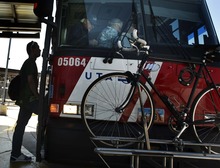This is an archived article that was published on sltrib.com in 2014, and information in the article may be outdated. It is provided only for personal research purposes and may not be reprinted.
Somewhere in our community, right this minute, there is likely to be at least one household where someone cannot get to work because her car has broken down. And who cannot get the money she needs to fix that car because she cannot get to work.
In some cases, a person in such a pickle has an easy solution. Take public transit to work. But that is not a practical option for far too many people who live along the Wasatch Front because the local provider of public transportation, the Utah Transit Authority, faces a similar dilemma.
The UTA doesn't have the funds it needs to expand its service — routes and hours — to the level that would properly serve the modern metropolis where it operates. And it is going to find it difficult to raise that much money until the general public — riders and otherwise — accepts UTA as the kind of service that is worthy of a major city and its suburbs.
And its taxpayers.
Thus leaders of an independent organization of people who ride UTA — or wish they could ride it — were up before a committee of the Utah Legislature the other day pushing for a means by which UTA could, in effect, fix its old car.
Right now, UTA is largely funded by a fraction-of-a-penny sales tax that the voters in the hodgepodge of cities and counties the agency serves have been willing to impose upon themselves. That tax is as low as 0.3 of a cent in Tooele County and as high as 0.69 of a cent in Salt Lake County.
Leaders of the Utah Transit Riders Union told lawmakers Wednesday that a region-wide sales tax of a full penny on the dollar would be a fair way to bring in the extra revenue the agency needs to expand is service to modern metro levels.
To be that kind of service, it would have to be predictably useful to working people with jobs at restaurants, hospitals and other businesses that operate other than 9-to-5 hours. They must know they can use UTA buses, TRAX and FrontRunner to get to work. And to get home again.
And the one-cent sales tax, in line with that charged in such metro transit districts as Denver and Minneapolis, would go a long way toward getting our community the level of services it needs and deserves.
To get that higher tax rate in place will require the approval of — in this order — the Utah Legislature, the local governments where UTA runs, and the voters in each of those municipalities. The agency itself, under fire for not only its sparse services but also the understandable public perception that the agency overpays its managers and is far too cozy with land speculators, will have a lot of convincing to do.
The Legislature should let it try.



